One meeting down and two more to go before recommendations could emerge for a new name to adorn the forthcoming Arlington Career Center building.
Arlington Public Schools last month created a naming committee to discuss potential names for the new building, which will house the Arlington Career Center and the handful of programs within it, including Arlington Tech. As the committee has just starting meeting, no contenders have yet emerged for the building on S. Walter Reed Drive, slated for completion in the fall of 2026.
“It’s been a really great learning experience because we found out that there are clear criteria for how you name a new building in Arlington,” such as inclusive discussions with the community and a pick that reflects its values and the education happening inside, says Margaret Chung, the principal of the Arlington Career Center (ACC).
“Whether you’re within or without from outside, when you hear that name it’s like ‘Ah yeah, I get it, that’s who you are,” she continued.
Monica Caldera, the ACC diversity, equity and inclusion coordinator, says that starting this conversation has helped administrators “to see many perspectives about changing the name and what that means to people.”
The building name matters to ACC staff, who say the Career Center inside is set apart from Arlington’s comprehensive high schools by its name and function. While it offers more career-readiness programming than a typical high school, it is not a “vocational” school, per se.
“I think the term vocational gets into people’s minds of, ‘Oh ok, so you’re only going to go into a shop and you’re going to learn that skill and then you’re going to go out and do that skill, ” said Michelle Van Lare, the program coordinator for Arlington Tech. “And it’s really limiting to a high school student to be told that’s the track that you’re on.”
Instead, she says, ACC offers hands-on programs to students in grades 9-12 that teach skills necessary for their academic or professional goals.
“You can be in auto mechanics and in physics at the same time and learning the same material, but in one you’re actually doing it and in the other one, you’re sitting in the classroom writing about it,” said Van Lare. “That’s how we learn.”
In addition to its core curriculum, Arlington Public Schools offers Career and Technical Education (CTE) courses students either take at the Career Center or at their local high school. About half of all students in grades 9-12, or 4,000, take CTE courses, with 1,000 students either enrolled at the Career Center or traveling to and from there for a course, Career, Technical and Adult Education Director Kris Martini told the School Board last month. ACC students can also take dual-enrollment classes and graduate with an associate’s degree.
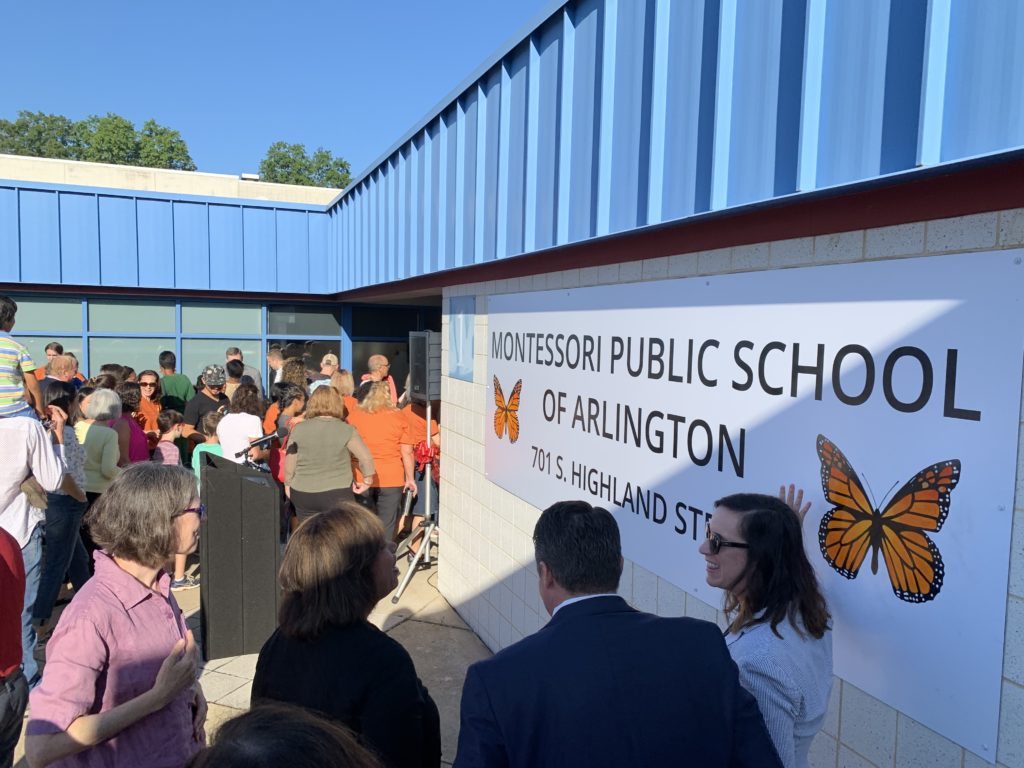
(Updated at 12 p.m.) An elementary school has become the next flashpoint in discussions of how Arlington Public Schools should use its existing buildings.
Last year, the Nottingham Elementary School community was roiled by a potential plan to close the school and turn the building into a “swing space” to accommodate students whose home schools were under renovation.
Directed to explore this option by School Board members, APS officials ultimately walked back the proposal: Middle schools needed the most attention and their student populations would not fit at Nottingham. Plus, parent opposition was fierce.
The focus has now shifted to the Montessori Public School of Arlington (MPSA) and plans to relocate it to the current Arlington Career Center site once the new building is finished next door.
Once located within Drew Model School, MPSA moved into the former Patrick Henry Elementary space in 2019 as that school community moved into a new neighborhood school, Fleet Elementary. The Patrick Henry building, meanwhile, is now showing its age at 50 years old.
“We have issues around physical space and with the HVAC system. We have had classrooms that are uninhabitable at various parts of the year but we don’t have anywhere else to go,” Jamey Borell, president of the PTA, tells ARLnow. “They are trying to make do with space heaters and fans… Our Montessori community is very good at making do.”
Of the 20-odd classrooms, 14 do not meet current educational specifications, according to School Board member Cristina Diaz-Torres, describing her recent visit to the school and discussing several issues, including corroding water heaters and a leaking roof.
“This building is falling apart at the seams. And if you walk through that building, it is very clear that… it was supposed to be temporary, and it should be temporary,” she said in a December School Board meeting.
Fellow parent Michael Bruno tells ARLnow the school community moved into Patrick Henry with this understanding, believing the MPSA would move into the legacy Arlington Career Center building after the new building is complete. Now, however, some attitudes have shifted.
Leaders from the County Council of PTAs and the Joint-Facility Advisory Committee, as well as two current and former School Board members, say this may not be the most financially sound course and more options should be explored. MPSA parents say APS should stick to its promise to move MPSA to the Career Center site and keep the program in South Arlington.
The diverging viewpoints emerged during public comments and a School Board discussion in December. In a rare split vote, members voted 3-2 to direct APS staff to explore and present low-, medium- and high-cost scenarios, not to exceed $45 million, for relocating MPSA into the Career Center building.
This means that staff will not explore other options off-campus as they develop the forthcoming 2025-34 Capital Improvement Plan, to be presented in May 2024. Building life span and use is top of mind for the School Board, which also directed Supt. Francisco Durán to include deep dive studies into how existing facilities should be renovated.
Current member Mary Kadera and now-former member Reid Goldstein voted against this direction.
“I really worry that our planning will be incomplete and short-sighted,” she said of the decision not to consider other locations for MPSA.
APS has to study additional scenarios, including how it could use some 1,000 open elementary seats around Arlington, if is going to be careful stewards of limited capital funds, she said. Current estimates put the cost of relocating MPSA to the Career Center at $39-45 million.
“[More study] might very well demonstrate that the best possible option is to house MPSA in the legacy building. I’m not arguing against that scenario,” Kadera said. “I am simply arguing that we owe it to the community to recognize our changing needs and circumstances and study the alternative.”
(Updated 2/19) Advocates are calling for Arlington County to invest $2 million in additional programs to stop students from dying of drug overdoses.
The mother of an Arlington ninth grader who died of an apparent fentanyl overdose in September joined over 250 others on Wednesday to demand additional funding for free after-school programs. Organizers say a scarcity of accessible, interesting programming makes students more likely to fall into drug addiction.
“We as parents and members of this community ask you to invest in after-school programs,” organizer Janeth Valenzuela, co-founder of the Arlington Schools Hispanic Parents Association (ASHPA), told officials in attendance at Kenmore Middle School. “It is an investment in life, in a better future, in a different destiny for our children. We know from experience that affordable programs at the schools will help.”
Luz Rodríguez, the mother of Jorge Rodríguez, pleaded with Arlington County Board Vice-Chair Takis Karantonis and member Maureen Coffey, who were in attendance, to work to ensure that her son is the last child in Arlington to die from drugs.
“We must all work together to stop this terrible disease that is killing our children,” Rodríguez said in Spanish, which was translated for English speakers.
Karantonis pledged to enter this year’s budget negotiations “with a $2 million mindset.”
“If the price is $2 million, this is the funding that’s needed? Then let’s do it,” said the Board member, who in November carried a motion to increase funding for programs combating teen substance abuse.
Coffey begged off on pledging a specific amount but said she would “fight for significant and ongoing funding.”
School Board members Mary Kadera and Bethany Sutton were also present at the event.
The County Board voted 3-2 in November to set aside $750,000 to build up initiatives relating to drug use among young people. So far, the county has used this money to expand teen programming on the weekends, enhance juvenile case management and increase outreach about existing programs.
Last month, County Manager Mark Schwartz said the Department of Human Services had also hired two additional counselors, one at Washington-Liberty High School and one at Wakefield High School. Jorge Rodríguez attended Wakefield and was the second student at that school to die last year.
Two additional counselors were being onboarded in January to work at Yorktown High School and the Arlington Career Center.
Virginians Organized for Interfaith Community Engagement (VOICE) hosted listening sessions with hundreds Arlington high school students and parents, most of whom were people of color, before making its $2 million recommendation, per a media packet. The funds would allow 200 young people in underserved communities to attend three hours of free programming every day after school.
Students and parents expressed interest in soccer options beyond recreation, travel and school teams. Other areas of interest included art, cooking, tennis, film, photography and podcasting.
Schwartz said in January that the county was “working on” an expanded soccer program, which he expected to go live by late February, in addition to a newly expanded basketball program.
VOICE, alongside ASHPA and the Arlington branch of the NAACP, says it supports more substance abuse education and access to behavioral health professionals. Its media packet says Arlington lacks widespread, relevant education initiatives on this topic, while many students said that accessing counselors and behavioral health professionals is difficult.
For a Wakefield senior named Marina, the need for a better response to the opioid crisis is personal.
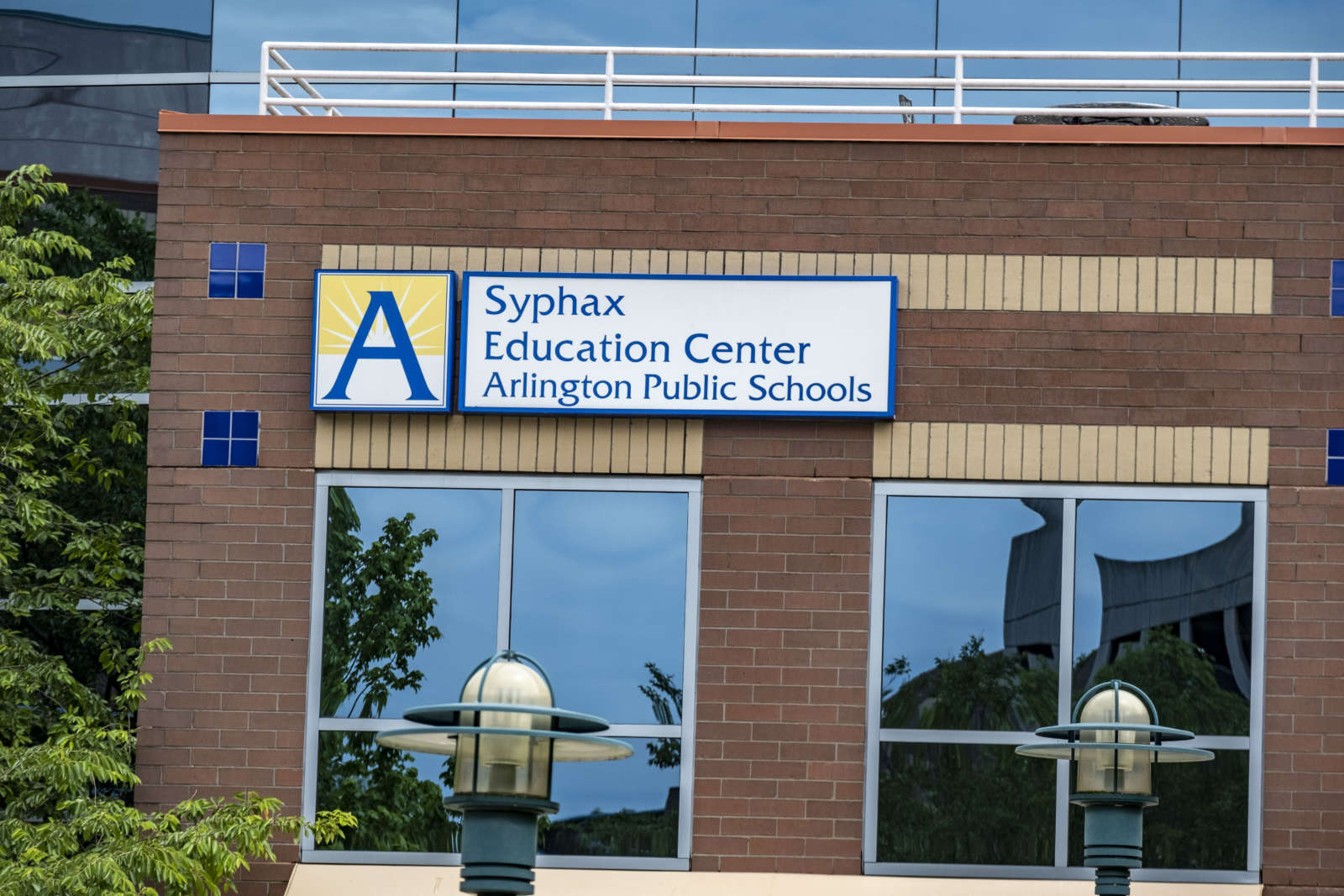
School Board watchdog group Arlington Parents for Education (APE) is asking the auditor for Arlington Public Schools to dive into the potential impacts of an increase in paid holidays for year-round staff.
Two school years ago, new religious and cultural holidays were added to the calendar and Supt. Francisco Durán announced APS would fully close for winter and spring breaks. APE said in a new letter to the auditor that this decision could cost millions and may hurt morale of 10-month employees, who are not paid for these days off.
The letter, signed by APE Board members Alison Babb, Sheila Kelly, Sheila Leonard, Amy Rzepka and Katie Sunderland, concludes as follows:
We believe there is a strong rationale for either the School Board to add this to the work plan or for the auditor to initiate this audit. APS policy states that the internal auditor ‘shall prioritize’ audits based on risk to the division, and compliance with School Board policies, among other factors. This practice of providing 12-month staff with 26-32 paid holidays is now inconsistent with APS’ holiday policy, which still technically provides for only 13 paid holidays. Additionally, there is ample evidence… that this practice is adversely impacting APS operations and therefore presents a risk to the division.
The two changes made in 2021, by APE’s count, increased paid holidays that 12-month employees have from 13 to at least 26. Pointing to a 2020 estimate that furloughing 12-month staff for one day could save APS some $300,000, the board members say the additional paid holidays could cost $6 million annually. They do note, however, that APS has elsewhere said there is no financial cost to the changes in days off.
APS tells ARLnow the School Board decides what the auditor will take up and disputes APE’s holiday math. Over the last two years, not including annual leave, 12-month staff worked on average 234 days and received between 12-15 days off while 10-month staff worked an average of 189 days and have received 11 days off, per school system spokesman Frank Bellavia.
Arlington School Administrators, or ASA, the bargaining unit for principals, assistant principals, supervisors and some directors, likewise says the gains in paid holidays have been modest. Administrators gave up six days of annual leave in exchange for the spring and winter breaks, as part of collective bargaining negotiations last fiscal year, says Susan Robinson, who was the executive director of ASA for 13 years, overseeing the negotiations in question before stepping down recently.
APE contends that APS should have publicly discussed whether it would be fully operationally closed during winter and spring break before these were extended to 12-month staff. Durán at the time said the change did not require School Board approval because it involved “non-student days.”
“The decision to close during winter and spring breaks came out of Covid and aligns with some of our neighboring jurisdictions wherein 12-month employees are granted time off during these time periods,” Bellavia said. “Over the last two fiscal years, APS has communicated to stakeholders that offices and schools would be closed during these time periods.”
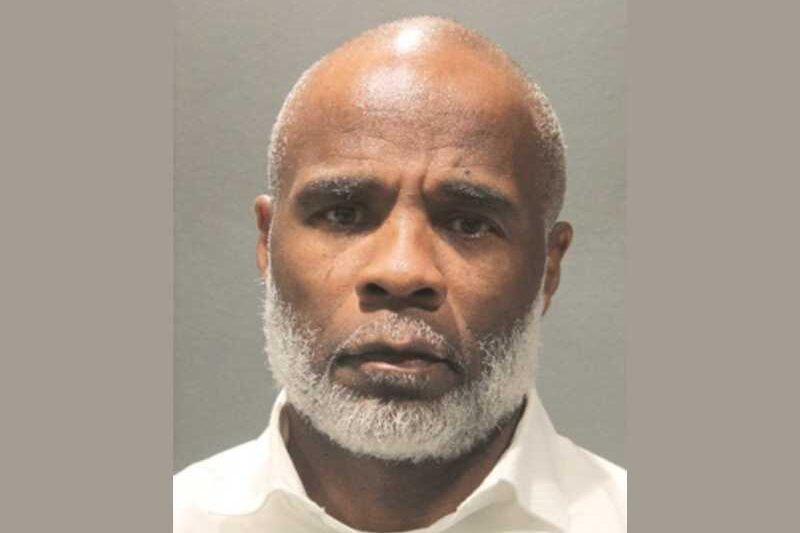
Arlington police have charged a former Washington-Liberty High School basketball coach with sexual offenses and are seeking possible additional victims.
George Porcha, 53, of Winterville, North Carolina, is charged with carnal knowledge of a minor and taking indecent liberties with children, per an Arlington County Police Department press release sent out this evening (Tuesday).
ACPD started its investigation in October 2022 after receiving information about possible offenses Porcha committed, involving minors, between 2000 and 2003, when he coached girls basketball coach at Washington-Liberty, then named Washington-Lee.
As a result of the investigation, warrants were issued this month for offenses involving two female victims who were juveniles and students at W-L at the time of the incidents, per the press release, which noted additional information is restricted following Virginia code.
During his tenure at W-L, he was the 2001 National District Coach of the Year, according to InsideNova. Porcha went on to be the head girls basketball coach at T.C. Williams High School, now Alexandria City High School, from 2004-07.
About a decade later, he coached the boys basketball team at Woodbridge High School from 2014-16 before leaving for Ole Miss, InsideNova reported at the time.
Porcha has also made the rounds coaching at colleges and universities, including Virginia Tech, West Virginia University, Ole Miss and Boston College. He was let go from Virginia Tech in the fall of 2022, per the Roanoke Times.
This remains an active criminal investigation, ACPD says. Anyone who has additional information related to this investigation or has had past inappropriate encounters with this suspect is asked to contact Detective P. Pena at 703-228-4183 or [email protected]. Information may also be provided anonymously through the Arlington County Crime Solvers hotline at 1-866-411-TIPS (8477).
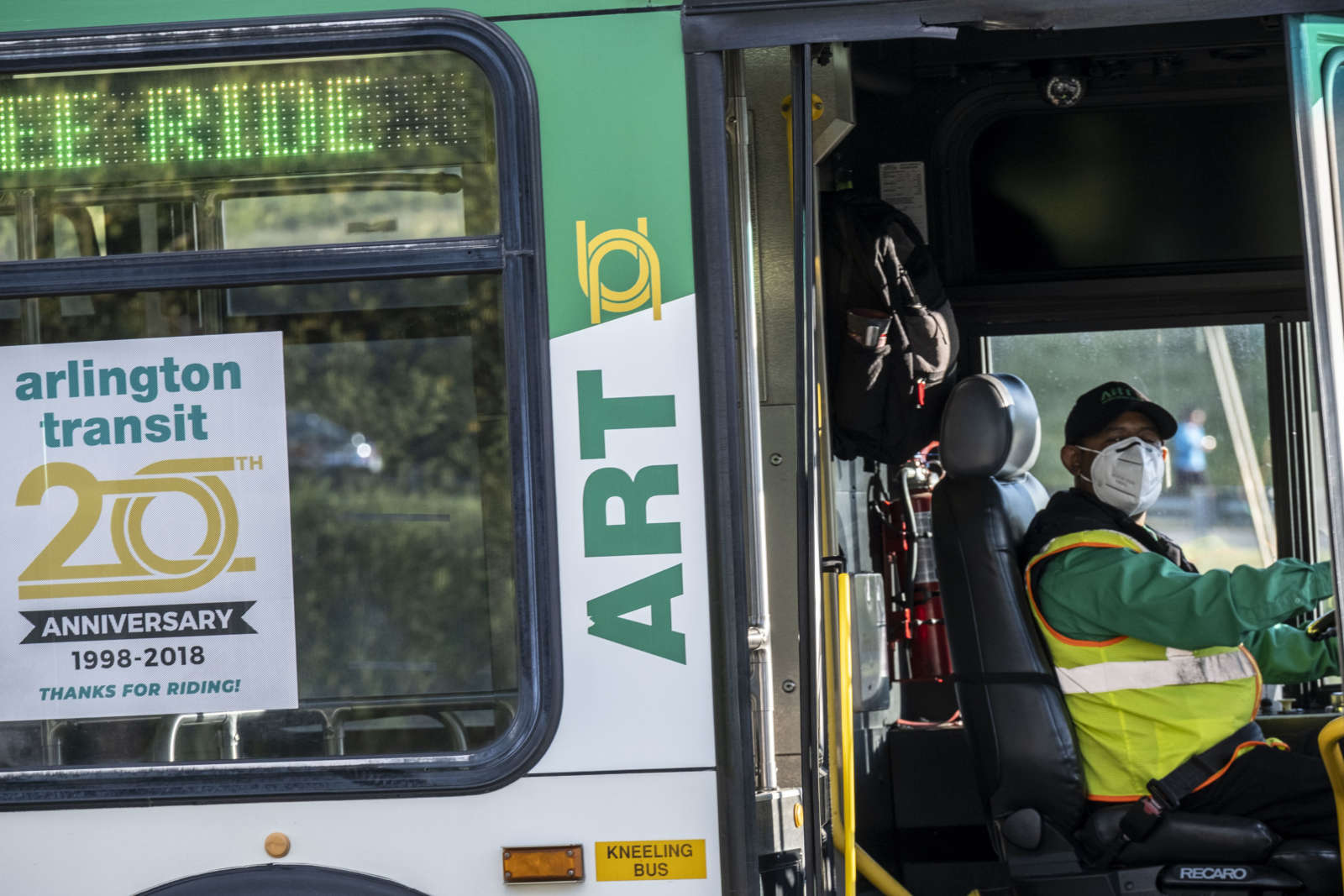
(Updated at 3:20 p.m.) Starting this month, Arlington students can now get free Metrobus rides throughout Arlington.
This builds on a program in place since 2022 allowing students with iRide SmarTrip card to ride Arlington Transit (ART) buses for free. Students who live in Arlington and are enrolled in kindergarten through 12th grade can obtain these cards from Commuter Stores in Arlington or, if they are APS students, through their schools.
Now, students with these cards will have free access to Metrobus’ greater range of service and hours, per a county press release. They will be able to travel to destinations that ART routes do not reach, including some schools, such as Swanson Middle School.
“APS is excited about the expansion of the Student iRide Fare Free Program to include Metrobus service within Arlington,” APS Director of Facilities and Operations Cathy Lin said in a statement. “This opportunity expands access for our students to travel in Arlington on public transit buses.”
The new program also responds to an increase in student ridership that the county ties to free ART travel for students. Arlington County reported that student ridership increased from 61,060 riders between January and September 2022 to 108,365 during the same period in 2023.
“We are encouraged to see that student ridership on ART bus has increased since the rollout of the student fare free program in 2022,” Dept. of Environmental Services spokeswoman Claudia Pors told ARLnow. “Our hope is that by expanding iRide to Metrobus, more young people will become comfortable and familiar using public transportation to get around Arlington safely and sustainably.”
Pors says there are currently no plans to expand the program to include Metrorail. Students can still access the Metro with an iRide SmarTrip card but they will have to pay the full fare amount.
The Arlington County Board approved the agreement with WMATA and the county in July 2023, the county press release says. The county allocated $360,000 in the 2024 fiscal year budget to reimburse Metrobus for the student rides.
Arlington County has taken other steps to make bus rides fare-free, including its free rush hour service on ART buses. Initially set to expire in December, the program was extended through this month.
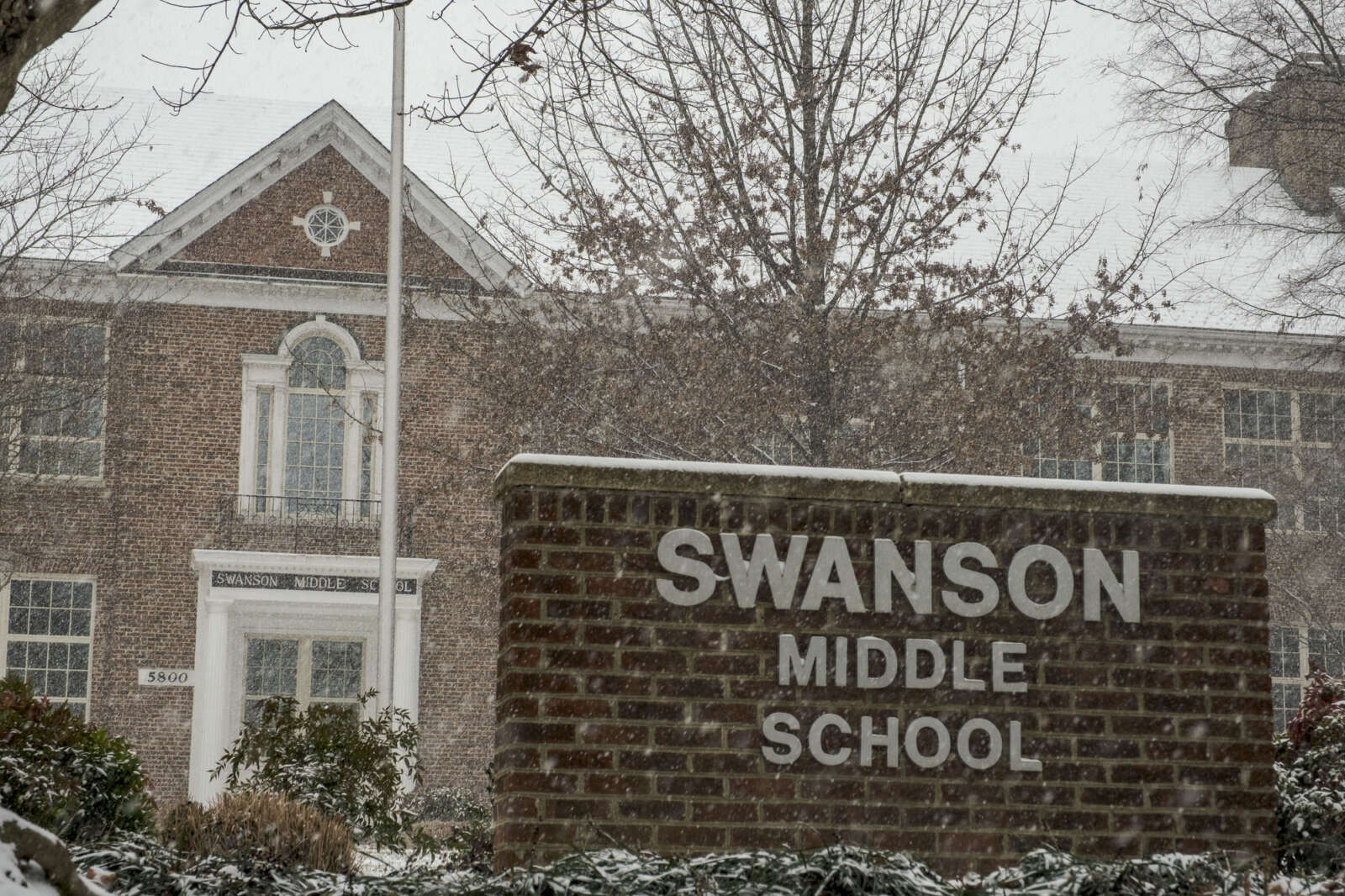
Arlington Public Schools has preemptively given students a snow day and an effective three day weekend due to expected accumulating snowfall tomorrow.
APS made the announcement just before 6 p.m., with several inches of snow in the forecast for Friday. Neighboring Alexandria and Fairfax County also announced Friday closures.
More from APS:
Fri, Jan. 19, 2024: Code 1 – All APS Schools & Offices Closed
CODE 1: Due to the Winter Weather Advisory in effect for Arlington tomorrow, all APS schools and offices will be closed Fri, Jan. 19, 2024. Unless otherwise directed by their supervisors, custodial and maintenance staff should report to work at their scheduled time. Extracurricular activities, games, team practices, field trips, adult education classes, and programs in schools and on school grounds are canceled. For updates about Pool Operations, go to www.apsva.us/aquatics. For information about Arlington County programs and operations go to www.arlingtonva.us.
The National Weather Service is currently predicting 2-3 inches of snow for Arlington, with the flakes starting to fly before sunrise.
Winter Weather Advisories have been expanded across southern MD & central VA. Snow amounts range from a 0.5-2" in these locations with 2-5" along & north of I-66/US-50. Snow moves in from the west between 1-5am & wraps up east of the mountains between 7-11pm. #MDwx #VAwx #Wvwx pic.twitter.com/kxXxj0QHY6
— NWS Baltimore-Washington (@NWS_BaltWash) January 18, 2024

After a snow day today, Arlington students will be going back to school on Wednesday — but on a two-hour delay.
Arlington Public Schools made the following announcement at 6 p.m.
Wed, Jan. 17, 2024: Code 2 – All APS Schools & Offices Will Open 2 Hours Late
CODE 2: Due to hazardous conditions resulting from yesterday’s storm, all APS schools and offices will open two hours late tomorrow, Wed, Jan. 17, 2024. The Extended Day program will also open two hours late and morning field trips are canceled. Custodial and maintenance staff and food service workers should report to work at their regularly scheduled time. All other employees should report to work two hours past their usual start time. For updates about Pool Operations, go to www.apsva.us/aquatics. For information about Arlington County operations go to www.arlingtonva.us.
Neighboring Alexandria and Fairfax County also announced two hour delays for Wednesday. Alexandria City Public Schools cited “extreme temperatures and the potential for hazardous conditions” as the reason for the delayed opening.
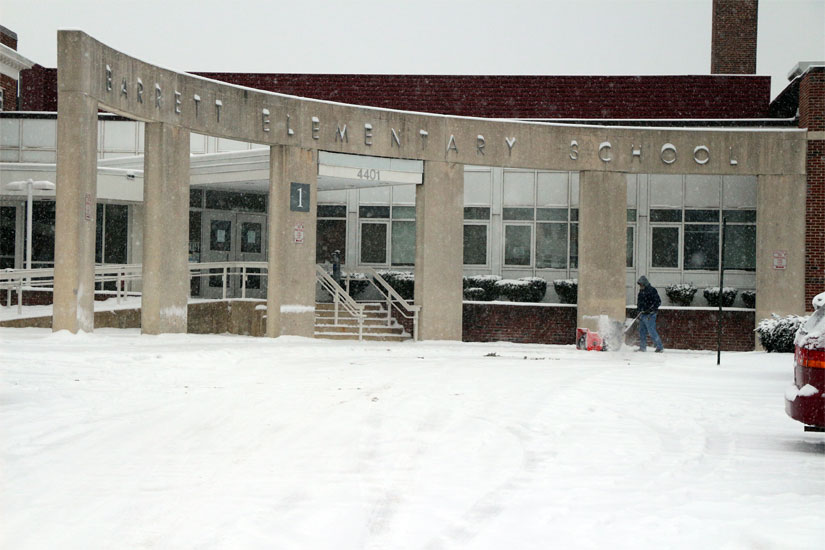
(Updated at midnight) There will be no classes for Arlington Public Schools students Tuesday.
The snow day means at least a four-day weekend for students, when combined with today’s Martin Luther King Jr. Day holiday. APS made the announcement around 6 p.m.
Tue, Jan. 16, 2024: Code 1 – All APS Schools & Offices Closed
CODE 1: All APS schools and offices will be closed tomorrow, Tue, Jan. 16, 2024. Unless otherwise directed by their supervisors, custodial and maintenance staff should report to work at their scheduled time. Extracurricular activities, games, team practices, field trips, adult education classes and programs in schools and on school grounds are canceled. For updates about Pool Operations, go to www.apsva.us/aquatics. For information about Arlington County programs and operations go to www.arlingtonva.us.
Nearby Alexandria, Fairfax County, D.C. and Montgomery County have also announced snow days. The area is, as of 11 p.m., under a Winter Storm Warning, with a couple of additional inches of accumulation expected overnight.
Arlington County government offices and courts, meanwhile, will open at 10 a.m. on Tuesday, while libraries are set to open at noon, the county announced Monday night. The federal government will be closed.
Due to inclement weather, Arlington County Government in-person facilities and Judicial Court proceedings will open at 10 a.m. on Tuesday, Jan. 16, 2024, unless otherwise stated. Libraries will open at noon.
Visit the County website for further details https://t.co/1bGNu4Ndeb
— Arlington County (@ArlingtonVA) January 16, 2024
1/16/24: Federal offices in the DC area are CLOSED.
Emergency and telework-ready employees must follow their agency’s policies.
Visit the link for more details: https://t.co/XNpFS40aXT
— U.S. Office of Personnel Management (@USOPM) January 16, 2024
At Reagan National Airport, the FAA is reporting, as of midnight, a Ground Stop due to snow and ice.
NBC 4 chief meteorologist Doug Kammerer said on social media that he arrived on an flight that’s now stranded on the tarmac at DCA while snow is cleared from runways. There are numerous other reports on social media of passengers stranded on planes at the airport.
Well DCA is shut down. We are on the tarmac, but not allowed to move until the runways are cleared off. Looks like it will be a while. Glad I made it home, but Doubtful I see you at 11. @amelia_draper will have you covered. #SNOW
— Doug Kammerer (@dougkammerer) January 16, 2024
Reagan National (DCA) is a MESS. Terrible comms between pilots and deicing trucks are being reported. Airlines caught off guard with DC Show. Jets blowing past DOT limits of 3 hours of full planes sitting on runways waiting for gates. Full jets lined up on runaways. Pilots… pic.twitter.com/DGoIJShfsm
— Jon Nicosia (@NewsPolitics) January 16, 2024
As snow continues to fall tonight, local roads are getting treacherous.
One crash near Rosslyn caused by the snow tonight was caught on video, below.
⚠️Snowy fender-bender in Arlington, VA. 🚗❄️ @ARLnowDOTcom @ArlingtonVaPD pic.twitter.com/VK6lik4uLO
— Ahmad Shah Mohibi (@ahmadsmohibi) January 15, 2024
Snow continues at a steady pace across the DMV with some spots reporting 1-2” already. Roads are becoming snow covered which is leading to hazardous travel conditions. Please take it easy out there! #vawx #mdwx #dcwx pic.twitter.com/LNt17APGr7
— Washingtonian Weather Geeks (@WashingtonianWx) January 16, 2024

(Updated at 4:55 p.m.) Arlington Public Schools experienced a data breach this week affecting information it collects for visitors to school buildings.
The school system notified people of “externally exposed” data in a message sent this afternoon (Friday). The breach is part of a broader leak, reported this morning, affecting some schools in the U.S. that, like APS, use a visitor management system from Raptor Technologies.
“Arlington Public Schools was contacted this week by our Visitor Management System vendor, Raptor Technologies, regarding the discovery of some APS data that was externally exposed for an unspecified timeframe,” Chief Operating Officer Dr. John Mayo said in the message, which APS shared with ARLnow.
“At this time, we do not know what specific APS information was exposed or if it was accessed by anyone,” he continued.
The leaked information could relate to government-issued IDs.
The visitor management software that Raptor Technologies offers screens each visitor’s government-issued ID card against sex offender registries in all 50 states and “an unlimited number of custom databases,” according to its website.
This information is collected when visitors enter and exit a building, according to someone familiar with how APS uses the system. The technology also scans APS ID badges, for those who have them, and is used partly for substitutes to record when they show up for work.
Visitors receive a badge with their photo, name, role, destination and date and time of entry, according to Raptor.
APS says Raptor took action after learning of the breach.
“Upon learning of the breach, Raptor secured the accessible information and initiated an investigation,” Mayo’s message said. “This issue has affected many school systems nationwide, not only APS. For your awareness, this system is used to manage visitors and volunteers entering our facilities. APS utilizes a limited number of services offered by Raptor, compared to the full range of its capabilities.”
The school system says it is working with Raptor and will give updates as it learns more information.
“The safety of our students, staff and community is our utmost priority, and we will continue working with Raptor to ensure that all necessary steps are being taken to safeguard the information in Raptor,” Mayo said.
This was not the only tech issue that APS faced this week.
It appears APS used up all of its allotted Google cloud storage space — 122 terabytes, or roughly 5 gigabytes per user — according to June Prakash, the head of the local teachers union, Arlington Education Association.
“Some staff could not access email or other documents including plans for the upcoming days,” she said.
On Saturday, APS got to work to resolve issues some users reported, including being unable to save documents, according an email sent to staff. By Monday, “the issue reported with Google has been resolved,” a follow-up email said.
An APS spokesman later said the brief disruption was caused by a “service subscription issue between our retailer and Google,” and the school system worked to ensure the service was restored on Monday morning.
Photo via Burst/Unsplash
Arlington Public Schools is poised to tie planned S. Walter Reed Drive upgrades into its $180 million Arlington Career Center project.
This past Saturday, the Arlington County Board approved a memorandum of agreement permitting APS to appoint the same contractor for the Career Center’s construction to handle the road improvements — part of the county’s Neighborhood Complete Streets program — from 5th Street S. to Columbia Pike.
Next, the agreement will head to the Arlington School Board for approval in January.
The upgrades to S. Walter Reed Drive will include new trees, protected bike lanes, a traffic light at the 9th Street S. intersection and improved bus stops. The community broadly supported these enhancements following a series of public feedback sessions held from fall 2020 to spring 2021, per a county staff report.
Currently, construction of the five-story Career Center at 816 S. Walter Reed Drive, slated to start next spring, is set to overlap with the road work. County and school officials agreed to merge the two projects to avoid traffic congestion and construction snags.
“So, essentially, when you have two contractors trying to work in the same place at the same time, somebody gets delayed,” APS Director of Design and Construction Jeffrey Chambers told School Board members during their meeting last Thursday.
Under the plan, the county will foot the bill for the road work, estimated at $7 million, and reimburse APS for any extra administrative costs, the report said.
APS is not required to contribute financially to the road improvements. Still, it must inform the county of any additional expenses due to construction delays. Should the road work exceed its budget, APS must obtain county approval before proceeding.
The bulk of the road work is expected to be completed within the first year of construction, with the final paving and overlay scheduled just before the Career Center opens in August 2026, Chambers said last week.
The funding for the S. Walter Reed Drive road improvements has already been earmarked in the county’s Capital Improvement Plan.
APS is still in the process of securing a contractor for the Career Center, which will host up to 1,619 students and include a four-story parking garage.
Officials plan to present the combined bids for the Career Center construction and road improvements to the County Board in early 2024. The Board will then approve the fund transfer and any additional construction financing.

